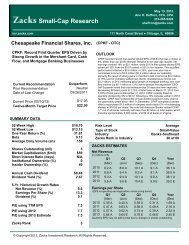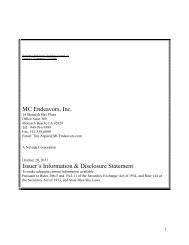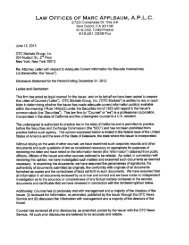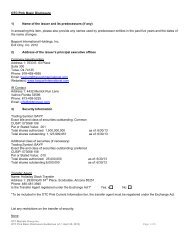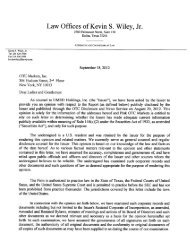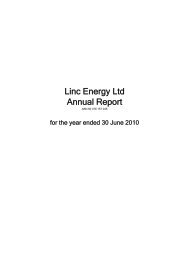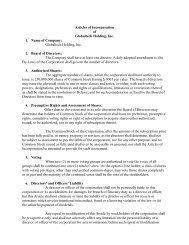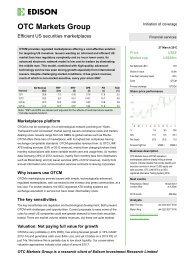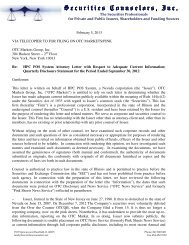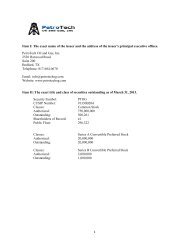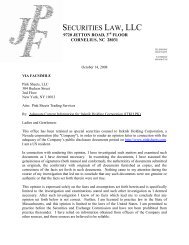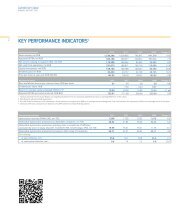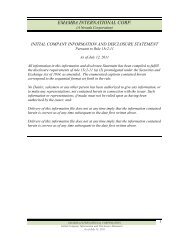2011 Annual Report - OTCIQ.com
2011 Annual Report - OTCIQ.com
2011 Annual Report - OTCIQ.com
You also want an ePaper? Increase the reach of your titles
YUMPU automatically turns print PDFs into web optimized ePapers that Google loves.
58 Risk <strong>Report</strong><br />
Capacity markets will play an important role for E.ON in a number<br />
of the electricity markets where it operates. Russia and<br />
Spain already have capacity markets, and Sweden has a peakload<br />
reserve capacity market. France and Italy have decided to<br />
create capacity markets, and the U.K. government has re<strong>com</strong>mended<br />
taking the same step. Germany is also weighing the<br />
issue. This could result in market-design risks for E.ON, which<br />
could face a <strong>com</strong>petitive disadvantage, particularly if there is<br />
a focus on specific generating technologies or if some existing<br />
assets are not included.<br />
The U.K. government is implementing a number of reforms to<br />
the country’s wholesale power market with the aim of providing<br />
incentives for investments in low-carbon generation and<br />
to maintain a reliable supply of electricity. The introduction<br />
of feed-in tariffs is intended to provide greater certainty of<br />
revenues for new nuclear capacity, new renewables capacity,<br />
and power plants equipped with carbon capture and storage.<br />
The introduction of a capacity market is intended to support<br />
investment in more flexible generating capacity that operates<br />
at lower load factors to help maintain security of supply. It is<br />
anticipated that the drafting of legislation to implement these<br />
reforms will continue in the first half of 2012 and that the<br />
measures will be fully implemented by the end of 2014. These<br />
reforms could affect E.ON’s generation activities in the<br />
United Kingdom.<br />
In view of the current economic and financial crisis in many<br />
EU member states, political and regulatory intervention<br />
(such as additional taxes, price moratoriums, and changes to<br />
support schemes for renewables) is be<strong>com</strong>ing increasingly<br />
apparent. Such intervention could pose a risk to E.ON’s operations<br />
in these countries. In particular, the refinancing situation<br />
of many European countries could have a direct impact on the<br />
E.ON Group’s cost of capital, which could create the risk of<br />
impairment charges.<br />
Further risks could result from the European Commission’s<br />
plans to change the regulation of derivatives traded over the<br />
counter (“OTC”) and possibly to rescind energy-trading <strong>com</strong>panies’<br />
exemption from the Markets in Financial Instruments<br />
Directive (“MiFID”). The Commission is considering introducing<br />
mandatory clearing of energy OTC trades that exceed an<br />
amount that has yet to be determined. This would increase<br />
the margin requirements for such transactions, which could<br />
lead to an increased liquidity risk. It could also have a negative<br />
impact on E.ON’s economic net debt. Rescinding the MiFID<br />
exemption for energy-trading <strong>com</strong>panies would have effects<br />
similar to the regulation of OTC transactions. These changes<br />
could also result in increased capital requirements and disclosure<br />
obligations for E.ON’s energy-trading <strong>com</strong>panies.<br />
Open Grid Europe (“OGE,” formerly E.ON Gastransport) is<br />
supposed to have been subject to incentive-based regulation<br />
since the start of 2010. In mid-<strong>2011</strong>, OGE made available to<br />
the German Federal Network Agency (known by its German<br />
acronym, “BNetzA”) documents the agency will use to set<br />
OGE’s initial revenue cap for the second regulatory period<br />
(2013–2017). We anticipate that the BNetzA’s cost analysis,<br />
including the process of seeking clarifications from OGE, will<br />
last until the summer of 2012. It will be followed by a new<br />
efficiency benchmarking, and a new assigning to groups, of<br />
Germany’s highly heterogeneous gas TSOs. The BNetzA will<br />
derive the revenue caps for 2013–2017 from the individual efficiency<br />
factor it calculates for each TSO. On November 2, <strong>2011</strong>,<br />
the BNetzA announced its decision regarding return on equity,<br />
which will be reduced from the current 9.29 percent to 9.05 percent<br />
for new assets and from 7.56 percent to 7.14 percent for<br />
old assets.



